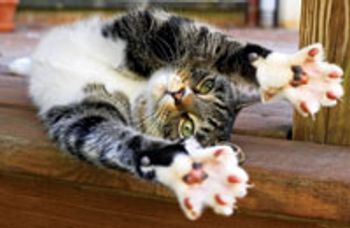
Over the course of a year, DVM Newsmagazine published hundreds of news stories about the veterinary profession and trends influencing it. This list and photo gallery chronicles events influencing your profession in 2009.

Over the course of a year, DVM Newsmagazine published hundreds of news stories about the veterinary profession and trends influencing it. This list and photo gallery chronicles events influencing your profession in 2009.

Washington -- The National Veterinary Accreditation Program (NVAP) is undergoing some changes, which will affect most veterinarians in terms of the continuing education they must earn and how their accreditation is renewed.

Sacramento, Calif. - Five California municipalities are working to ban cat declawing before a new state law takes effect that will prevent them from doing so, and one has already been successful.

Vet slapped with $20,000 bill as authorities crack down on waste disposal.

Six steps to complying with the Red Flags Rule.

Las Vegas -- Las Vegas residents will have to make sure they aren't keeping intact pets without a special permit starting this spring or they will have to pay hefty fines.

A total of six Calif. cities have now made some move toward declaw bans.

Livestock housing standards in Ohio now will be set by a Livestock Care Standards Board.

Sacramento, Calif. -- This is the last week veterinarians in California will be able to mail or fax Controlled Utilization Review and Evaluation System (CURES) reports to the state.

Sacramento, Calif. -- Gov. Arnold Schwarzenegger signed into law a bill making cattle and horse tail docking illegal in California.

Sacramento, Calif. -- Bipartisan support in the California Legislature was not enough to save two animal-welfare laws from Gov. Arnold Schwarzenegger's veto.

Columbia, S.C. -- The South Carolina Association of Veterinarians (SCAV) is pushing state legislators to allow veterinary team members to give rabies vaccines. At present, only veterinarians can administer the vaccination to cats and dogs.

Rockville, Md. -- The 2006 Executive Report from the National Antimicrobial Resistance Monitoring System (NARMS) was released today by the Food and Drug Administration's (FDA) Center for Veterinary Medicine.

Washington -- Uncle Sam's animal inspectors hope a proposed new rule under the Animal Welfare Act will make it easier to conduct unannounced inspections at circuses, mobile petting zoos and other animal acts.

National Report - Cases of identity theft, like those that took place at Kettering Animal Hospital, are not uncommonc, and are a reminder of how important it is to make plans to fight identity theft early on.

New Orleans -- Another municipal mandatory spay/neuter and breeding-restriction ordinance is under consideration, this time in New Orleans.

U.S. Rep. Kurt Shrader (D-Ore.), DVM, has been pulled into a number of discussions in Congress regarding public health, food safety and legislation targeting workforce expansion for veterinarians and calls on other DVMs and veterinary associations for input on policy decisions.

Washington -- The Veterinary Services Investment Act (VSIA), which will establish grants to confront veterinary-service shortages, was introduced by U.S. Senators Debbie Stabenow (D-Mich.) and John Thune (R-S.D.).

Santa Monica has joined San Francisco in trying to limit declawing before a new state law takes effect Jan. 1.

Washington -- The U.S. Food and Drug Administration (FDA) is asking health-care providers, veterinarians included, to voice their opinions on the regulation of medical products and prescription-drug promotions on the Internet and social networking sites.

Washington -- The U.S. Food and Drug Administration opened the new Reportable Food Registry (RFR), an electronic portal that food-industry officials are now required to use to alert the FDA when they have reason to believe their products might sicken or kill humans or animals.

Dissecting a state-board investigation can go a long way to easing fear and stress.

Harrisburg, Pa. -- Gov. Edward Rendell yesterday signed into law a measure permitting only veterinarians to perform ear cropping and tail docking of dogs at least 5 days old, plus devocalization procedures, cesarean deliveries and declawing of cats at least 5 days old. The new anti-cruelty law is an amendment to HB 2525, enacted last October, that established space and facility requirements for cages, exercise and mandatory semi-annual veterinary examinations for dogs housed in commercial breeding kennels. It also outlawed the euthanization of dogs by anyone other than a veterinarian. The law and the new amendment were sponsored by State Rep. Thomas Caltagirone in response to a publicized case of two brothers who killed 80 dogs at their breeding facility instead of making improvements ordered by a state health inspector.

Indiana's regulations on the sale and possession of reptiles, amphibians and fish are under review.

Snakes that squeeze and venomous reptiles must now be kept under lock and key in North Carolina.

Washington -- A new government study says the Department of Homeland Security (DHS) didn't adequately assess the biosecurity and economic risks of moving the Plum Island, N.Y., animal-disease research lab to a Kansas State University site in Manhattan, Kan.

Washington -- The Senate voted this week to slash funding for the National Animal Identification System (NAIS) developed by the Department of Agriculture as a means of protecting the nation's food supply.

The USDA has filed an injunction against Teva Animal Health Inc. leaders.

Sacramento - Legislators moved forward on a bill that would loosen its licensing practices to increase the number of veterinarians in the state.

Washington - Legislation introduced in the U.S. House of Representatives would create a new Division of Veterinary Medicine and Public Health at the federal level and invest monies to help solve work-force shortages in government and food-animal markets.